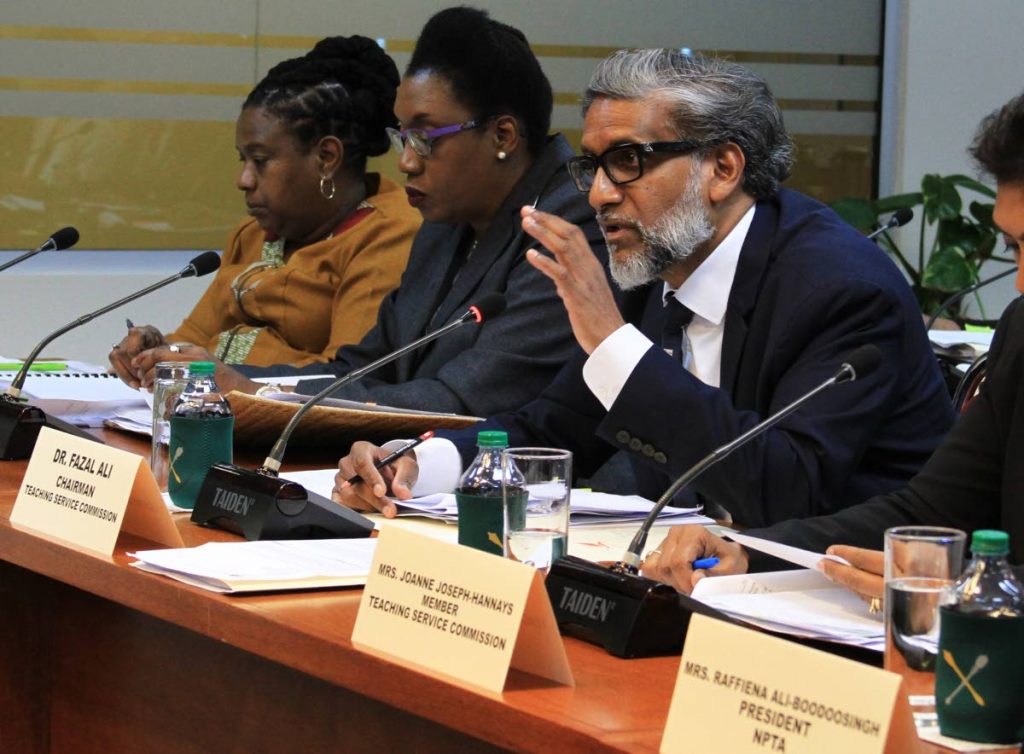Protect children in sex cases against teachers

Children involved in sexual harassment cases against teachers should be placed in a protective environment to make comfortable enough to give evidence against their perpetrators.
Teaching Service Commission (TSC) chairman Dr Fazal Ali admitted the commission's success rate in seeing these matters through to the end was low, but said it was the parents' unwillingness to have their children placed in a hostile environment.
Ali was speaking at a Joint Select Committee inquiry into Sexual Harassment in the Education Sector with specific focus on students at the ANR Robinson Room, at the Waterfront, on Friday.
"I cannot say why parents were willing to proceed in a magistrates' court and not a tribunal, but we have received letters saying they are not going to bring the child. Therefore, if there is no evidence and the witness is unwilling to come forward, the matter will fail and the commission must observe the rule of law. This is the predicament of the commission and that is why I am asking for some method where we can protect the child, find a way through the children's court to protect the child in such a way that the parent and the child feel safe to proceed with these matters.
"If the offence is persistent irregularity and unpunctuality of a teacher, the tribunal method is perfect. In 1966 when the Education Act was written and the regulations were drafted, the leadership of the country at that time could not have envisaged that someone would be texting a child to meet them for a rendezvous, and that is what is happening and these are not moderate texts. They are very explicit."
He said there were reports of a teacher touching the private parts of a male student, offering to do certain things to a student in primary school; one teacher commenting on the size of a male student's privates, one teacher squeezing a student's privates, a maxi taxi driver interacting with a child in the taxi and the principal advising the mother not to report it, and a male teacher poking a girl's belly and pulling up her shirt.
He said some of the reports were so blatant that he could not even say it.
"The process is failing because the children will not want to come and give evidence in a tribunal setting. The parents are unwilling to let the child go through that experience. Offences of a child against a child go to the children's court where there are special facilities, and rules and counselling. If it is a child against an adult it will also go to the children's court and there are special protocols to deal with that child.
"But once it is a case of an adult against the child it cannot go to the children's court, but to the magistrates' court and that is a very strange environment for the child. The parents of the child do not know how to cope in that environment, so the parents are generally unwilling to carry that matter to the magistrates' court. I think there is a gap in the way they are dealing with managing and protecting children in the children's court."
Ali said parents were not allowing their children to go through a tribunal and added there was urgent need to train a body as investigating officers.
"If we work closely with the police, Eric Williams Medical Sciences Complex and Children's Authority, we gather all the DNA evidence, have forensics questions asked so we can process and proceed with this matter.
"There must be some avenue for a child victim to be protected during the proceedings. If a lawyer can be appointed for that child by the State on behalf of the child, so when the attorney of the teacher is questioning that child, the child will not be intimidated, the questions will be directed to the attorney."
Asked what was the process after a teacher was accused of sexual harassment against a child, acting permanent secretary at the Education Ministry, Lenor Baptiste-Simmons, said there can be a recommendation for the suspension of the teacher. The ministry then appointed an investigating officer. Once the investigating officer's report was received it was then sent to the service commission's department which determined whether there was enough evidence to lay charges against the officer to appear before a tribunal.
She said while the complaint should go to the principal, it should also go to the police because it was a criminal act against the child.
Ali proposed that they consider establishing a multi-agency protocol per education district using local government as the lead.
"We have the protocol to arrest a child, but we don't have a protocol to protect that child when there is female teacher having sex with a male student in sixth form. Charging of a child, granting of bail, taking a child before the court... I have been pleading and asking to protect the child. When these children are so affected we must find the environment to make it safe for them to come forward and give evidence."

Comments
"Protect children in sex cases against teachers"